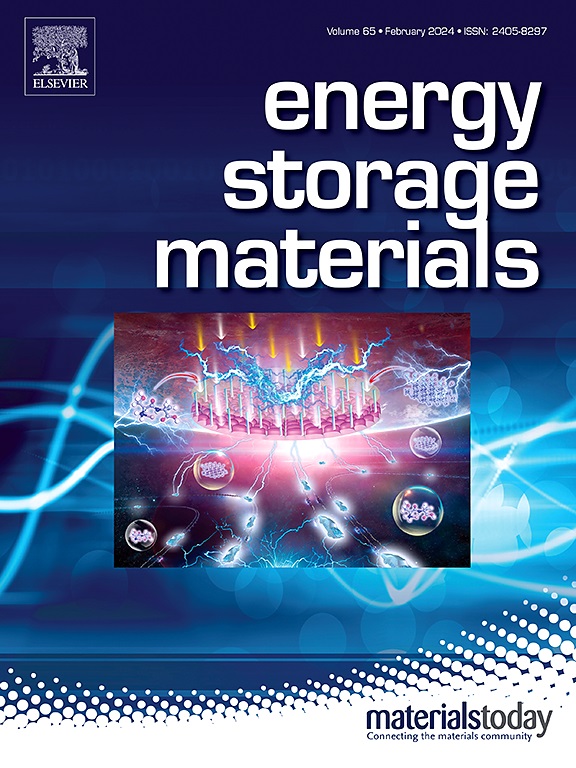Emerging Non-Carbon Cathodes for Advanced Mild Aqueous Zn-ion Capacitors
IF 18.9
1区 材料科学
Q1 CHEMISTRY, PHYSICAL
引用次数: 0
Abstract
Conventional Zn-ion capacitors (ZICs) predominantly utilize carbonaceous cathodes in carbon//Zn configurations, leveraging surface-dominated ion adsorption/desorption to deliver high power density and prolonged cycle life. As carbon-based systems approach their performance ceiling, cathode evolution is increasingly pivoting toward non-carbon materials. While prior reviews have acknowledged their existence, a comprehensive review remains absent. Herein, this review systematically charts the paradigm shift to non-carbon cathodes, dissecting their Zn-ion storage mechanisms and performance landscapes. Emerging non-carbon cathodes are categorized as pseudocapacitive-type (MXenes, transition metal compounds, organics, etc.) and battery-type (V/Mn-based compounds, Prussian blue analogs), with rigorous evaluation of voltage window, specific capacitance, energy/power density, rate capability, and cycle stability. Persistent scientific challenges, including restricted theoretical capacitance, suboptimal electrolyte compatibility, material dissolution, structural degradation, and sluggish storage kinetics, are critically discussed. The review further analyzes optimization strategies across material design, structural modulation, and electrolyte formulation refinement to solve these challenges. Looking forward, we propose targeted research priorities to propel non-carbon cathodes beyond current constraints. This review underscores the translational potential of non-carbon cathodes in redefining the performance frontiers of mild aqueous ZICs, ultimately harmonizing high energy/power density, ultrafast storage kinetics, and robust durability.

新出现的非碳阴极用于先进的温和水性锌离子电容器
传统的锌离子电容器(ZICs)主要利用碳/锌结构的碳质阴极,利用表面主导的离子吸附/解吸来提供高功率密度和延长循环寿命。随着碳基系统接近其性能上限,阴极的发展越来越多地转向非碳材料。虽然以前的审查已经承认了它们的存在,但仍然缺乏全面的审查。在此,本综述系统地描绘了向非碳阴极的范式转变,剖析了它们的锌离子储存机制和性能景观。新兴的非碳阴极被分为假电容型(MXenes,过渡金属化合物,有机物等)和电池型(V/ mn基化合物,普鲁士蓝类似物),具有严格的电压窗,比电容,能量/功率密度,倍率能力和循环稳定性评估。持续的科学挑战,包括有限的理论电容,次优电解质相容性,材料溶解,结构降解和缓慢的存储动力学,批判性地讨论。本文进一步分析了材料设计、结构调制和电解质配方改进等方面的优化策略,以解决这些挑战。展望未来,我们提出了有针对性的研究重点,以推动非碳阴极超越当前的限制。这篇综述强调了非碳阴极在重新定义温和水性ZICs性能前沿方面的转化潜力,最终实现高能量/功率密度、超快存储动力学和强大的耐用性。
本文章由计算机程序翻译,如有差异,请以英文原文为准。
求助全文
约1分钟内获得全文
求助全文
来源期刊

Energy Storage Materials
Materials Science-General Materials Science
CiteScore
33.00
自引率
5.90%
发文量
652
审稿时长
27 days
期刊介绍:
Energy Storage Materials is a global interdisciplinary journal dedicated to sharing scientific and technological advancements in materials and devices for advanced energy storage and related energy conversion, such as in metal-O2 batteries. The journal features comprehensive research articles, including full papers and short communications, as well as authoritative feature articles and reviews by leading experts in the field.
Energy Storage Materials covers a wide range of topics, including the synthesis, fabrication, structure, properties, performance, and technological applications of energy storage materials. Additionally, the journal explores strategies, policies, and developments in the field of energy storage materials and devices for sustainable energy.
Published papers are selected based on their scientific and technological significance, their ability to provide valuable new knowledge, and their relevance to the international research community.
 求助内容:
求助内容: 应助结果提醒方式:
应助结果提醒方式:


